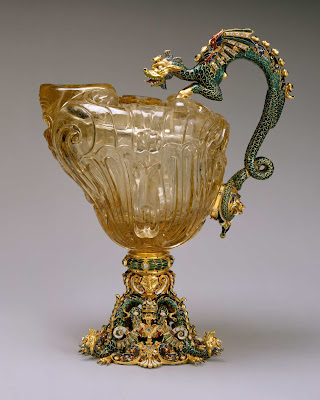 |
| Gasparo Miseroni Cup with cover ca. 1550 carved rock crystal, gold mounts Prado, Madrid |
"The Miseroni originally of Milan worked for the Habsburg court in Prague throughout the seventeenth century. Theirs was one of the great workshops specializing in the carving of rock crystal."
– curator's notes, British Museum
 |
| Gasparo Miseroni Shell-shaped Cup ca. 1565-70 carved rock crystal, enameled-gold mounts Kunsthistorisches Museum, Vienna |
 |
| Gasparo Miseroni Dragon-shaped Cup ca. 1565-70 carved lapis lazuli, enameled-gold mounts set with gems Kunsthistorisches Museum, Vienna |
 |
| Gasparo Miseroni Vase and Cover before 1573 carved agate, gold mounts set with gems Prado, Madrid |
 |
| Miseroni Workshop Two-handled Vase ca. 1580 carved rock crystal and smoky quartz, gold mounts Prado, Madrid |
 |
| Miseroni Workshop Bowl ca. 1580 carved chalcedony, gold mounts Prado, Madrid |
 |
| Ottavio Miseroni Shell-shaped Cup ca. 1600 carved jasper, gold mounts Prado, Madrid |
 |
| Miseroni Workshop Two-handled Bowl ca. 1610 carved rock crystal, gold mounts Prado, Madrid |
 |
| Miseroni Workshop Vase and Cover ca. 1620 carved citrine, enameled-gold mounts Prado, Madrid |
 |
| Miseroni Workshop Vase and Cover ca. 1647 carved smoky quartz, enameled-gold mounts set with gems Prado, Madrid |
 |
| Miseroni Workshop Vase and Cover ca. 1650 carved rock crystal, silver-gilt mounts Victoria & Albert Museum, London |
 |
| attributed to Ferdinand Eusebio Miseroni Ewer ca. 1680 carved rock crystal, enameled-gold mounts, diamonds Metropolitan Museum of Art, New York |
 |
| attributed to Dionysio Miseroni Vase with Nereid figure ca. 1600-1620 carved rock crsytal, gold mount set with gems British Museum |
"The Venetian collector Andrea Vendramin showed his pride in the 'extremely honourable decoration' of ancient Greek and Apulian vases in his study. The manuscript catalogue of 1627 which details this part of his collection, De Sacrificiorum et Triumphorum Vasculiis, is prefaced with his sketch of one wall of the room in which the vases were carefully arranged and classified in individual wooden compartments. The catalogue reveals that Vendramin's collection contained several objects that were not ancient, but does not indicate whether Vendramin was himself aware of this. A standing cup of rock crystal is illustrated on folio 31, which, from its engraved decoration, proportions and carving technique, would seem to be a product of the famous Miseroni workshop. It can be compared with a similar vase [immediately above] which dates from the early seventeenth century and is attributed to Dionysio Miseroni, working in Prague (British Museum, London). Significantly, this vase later belonged to Sir William Hamilton, who considered it to be ancient."
Dora Thornton's suggestive mention here of the Miseroni workshop occurs in her book, The Scholar in His Study (Yale University Press, 1997). She is inquiring about material embellishments thought proper and impressive for the small, personal library-and-treasure-rooms used both as serious retreats and as status-symbols in Renaissance and Baroque times. " . . . so by gathering together an ensemble of so many gems and objects of extraordinary beauty and richness, and not omitting to put in their places some little vases of agate and other precious stones, you will give pleasure to yourself regularly and to others on occasion, besides it serving as an antidote to all your worries."
 |
| Dionysio Miseroni Vase and Cover 1639-40 carved rock crystal, gilt-bronze mounts, enamel Liechtenstein Museum, Vienna |